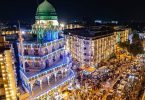F.P. Report
ISLAMABAD: President Asif Ali Zardari has approved a special remission of 180 days in sentences for eligible prisoners under Article 45 of the Constitution on the blessed occasion of Eid Milad-un-Nabi (Peace Be Upon Him).
This decision was taken on the advice of the Prime Minister Shehbaz Sharif and the Federal Cabinet, who had originally recommended a 100-day remission, a press statement said.
After due consultation, and in a spirit of mercy and compassion, the Prime Minister concurred with the President’s proposal to enhance this remission to one hundred and eighty days.
The special remission will apply to prisoners meeting the prescribed criteria under the law, while those convicted of serious crimes such as murder, terrorism, espionage, and major financial offenses will remain excluded.
However, the remission would not be applicable on the prisoners involved in murder, espionage and anti-state activities.
Besides, the prisoners involved in rape, theft, robbery, kidnapping, terrorism and financial crimes, would also be ineligible for the remission.
Earlier, in his message on the occasion of 12th Rabi-ul-Awwal, honouring the birth of Prophet Muhammad (Peace Be Upon Him), President Zardari highlighted the day as a time to revive spirits, come closer, and align with the teachings of the Prophet Muhammad (PBUH).
Asif Zardari called 12th Rabi-ul-Awwal a “historic and sacred occasion.” He urged citizens to represent the values of compassion, equality, and brotherhood taught by the Prophet Muhammad (PBUH).
“This day reminds us to live according to the teachings of the Holy Prophet Muhammad (PBUH), who encouraged fairness, helped those in need, and worked for peace among different communities,” he stated.
President Zardari stressed that Prophet Muhammad’s (PBUH) life is timeless guidance for resolving present-day difficulties.
“The solution to the problems which the Muslim Ummah is facing lies in the light of the Prophet Muhammad’s (PBUH) teachings,” the President emphasised, urging the nation to find answers through the view of Seerat-un-Nabi.







